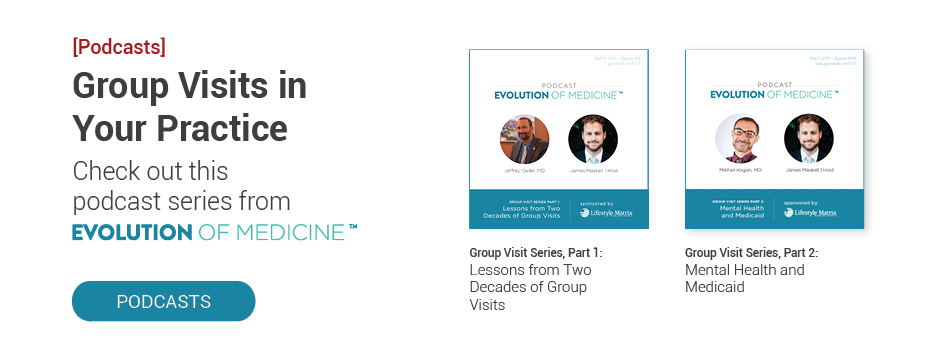No matter your medical discipline, if you can facilitate behavior change in your patients, you will see incredible results. It is simply the most powerful force in reversing chronic illness. Practitioners are looking for the most effective ways to facilitate behavior change in their patients, and a proven strategy is the Group Visit practice model. Researching this practice model or tuning into the Evolution of Medicine Podcast’s Group Visit Series will tell you that Group Visits are innovating the way we practice medicine. While the value of implementing Group Visits in practice is clear, the task of getting started can be daunting. Here are three important questions to ask yourself before you put Group Visits into practice:
- Do you want to create a community for your patients? One of the most profound benefits of hosting Group Visits is that your patients will feel a sense of tribe. During these unique shared medical appointments, patients listen to others with similar health concerns and share common struggles. Likewise, as patients learn and share in this environment, their feelings of isolation are replaced with renewed hope and a sense of community. With this deeper engagement, patients begin to feel a part of something bigger than themselves and cultivate a stronger clinical knowledge base guided by you and your staff. They now have a safe space they can turn to for answers, encouragement and connection.
- Are you looking for a way to increase revenue for your practice? A second and important reason to consider Group Visits is increased revenue for your practice. Patients value in-depth conversations with their practitioners, which simply cannot be accomplished in a 15- or 20-minute individual office visit. But in a 60- to 90-minute shared appointment, patients receive in-depth test marker descriptions and explanations of the root cause of various health concerns that their tests may reveal. For example, in my practice, each patient who runs a salivary hormone profile or functional stool test is asked to return to review their results and treatment plan in our Group Health Class on either hormones or digestive health. When we started our clinic three years ago, most classes had four to eight patients each week. Now, we see eight to 16 patients in each class, with an average group size of 12 patients. We bill each patient’s insurance for an E&M code of 99213, or $148. The resulting collection is typically $93 per patient. That is an additional $1,100 to $1,500 weekly or about $72,000 annually for our clinic. Since each class is 60-90 minutes, a group appointment an incredible value for patients and some of my most profitable hours of the week, garnering between $600 and $1,500/hour for my time.
- Do you find yourself explaining complex concepts to patients several times a day? A third reason to consider Group Visits is practicality. As our practice grows, we have felt a need to reduce wait times for return appointments by bringing similar health concerns together. When we offer a group appointment on digestion, for example, I discuss the same topics of avoiding inflammatory foods, SIBO, leaky gut, the microbiome, etc. as I would in an individual office visit. But by saying it once to a group, we free up time in my schedule for these patients, now equipped with a base knowledge of their health issue, to tackle their more individualized concerns. This improves continuity of care by providing more frequent touchpoints than can be accomplished with individual office visits. In addition to maximizing scheduling benefits for both practitioners and patients, Group Visits relieve practitioners of the monotony of repeating themselves on the same topics several times a week.
I have so enjoyed leading small groups of interested patients in Group Visits over the last three years, and I’m convinced it is one of the most fun, effective and impactful contributions I can make to patients’ health. If you’re interested in implementing Group Visits in your practice, the Group Visit Toolkit is a great place to start.
Christopher Mote, DO, DC, IFMCP
Christopher Mote, DO, DC, IFMCP, earned his doctorate in osteopathy from the Chicago College of Osteopathic Medicine at Midwestern University. He earned his doctorate in chiropractic and Bachelor of Science in human biology from the National University of Health Sciences NUHS in Lombard, Illinois, and is certified in Functional Diagnostic Medicine. Dr. Mote also serves as the ARK Stress Recovery Program Clinical Expert at the Lifestyle Matrix Resource Center. With a focus on addressing the root cause of health concerns, Dr. Mote specializes in the diagnosis and treatment of chronic health disorders.





